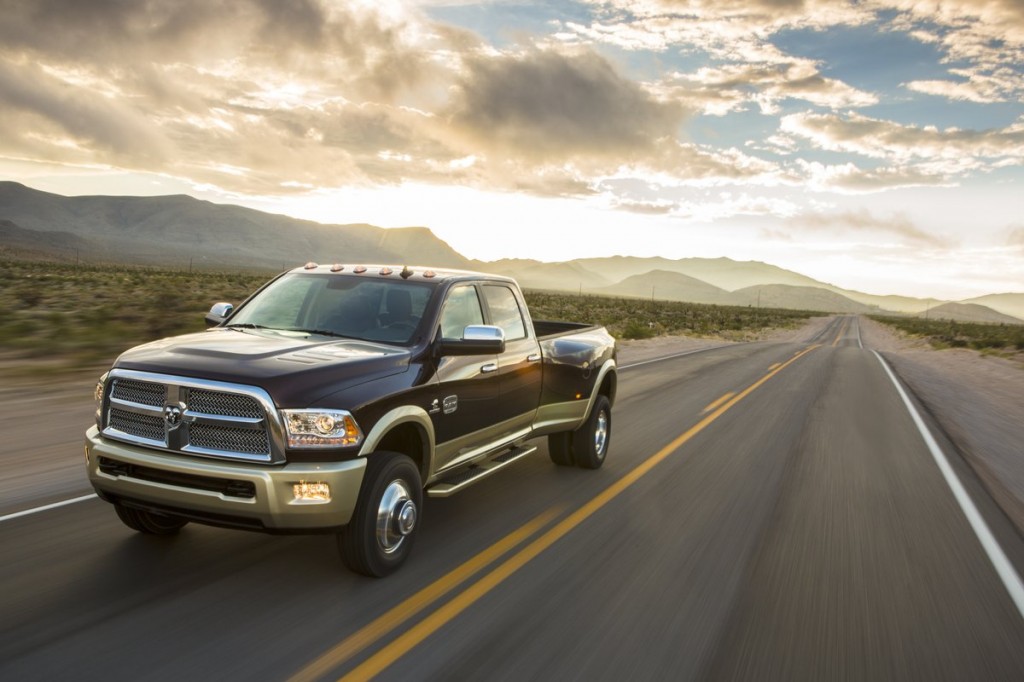About 15% of U.S. diesel trucks that were originally certified with emissions controls have had those systems tampered with.
That’s among the takeaways from a U.S. EPA report released last Friday. It suggests an environmental and public-health impact that within the U.S. could exceed that of the Volkswagen diesel scandal, given the prevalence of such trucks.
The report, from the EPA’s Air Enforcement Division (AED), and made available by the New York Times Wednesday, projects that emissions controls have been removed from more than 550,000 diesel pickups in the last decade, adding more than 570,000 tons of nitrogen oxides (NOx) and 5,000 tons of particulate matter over the lifetime of the vehicles.

2013 Ram 2500 HD
It gets worse. The report concludes that “due to their severe excess NOx emissions, these trucks have an air quality impact equivalent to adding more than 9 million additional (compliant, non- tampered) diesel pickup trucks to our roads.”
The methods covered include defeat devices—such as “delete tunes” or “delete kits” that suppress engine trouble codes from running dirtier, and hardware that completely disables EGR systems or exhaust components. The modifications are typically done when the vehicles are three years old—when there are fewer qualms about voiding the original factory warranty but when they’re still likely to have tens or hundreds of thousands of miles left.
In addition to state penalties that might apply, the federal civil penalty for enforcement is up to $48,192 for manufacturers and dealers for each act of tampering, and $4,819 for each aftermarket defeat device.
And yes, amid the Trump administration, there are violations—even some high-profile ones. Earlier this year, the owners of a Utah-based shop who became the stars of the Discovery Channel show Diesel Brothers were ordered to pay a fine of more than $850,000 for diesel emissions violations.

David
On the way to its findings, the investigation looked into accounts of tampering of emissions controls in Class 2b (medium duty) and Class 3 (heavy duty) diesel pickup trucks from 2010 through 2019. The former classification includes market top-sellers like the Ram 1500, Ford F-150, and Chevrolet Silverado 1500, while the latter includes their Heavy Duty (and Super Duty) equivalents like the Ram 2500, Ford F-250, and Chevy Silverado 2500 HD.
To make its estimates, it looked primarily at sales records and invoices, and the overall volume of parts sold, concluding with the current number of registered diesels how many must go to illegal applications.
Although it’s illegal to make the modifications and remove emissions equipment, it is legal to order the parts to make those mods; so the study looked into where those parts are most frequently ordered.
Based on that, it found North Dakota has the highest estimated number of diesel vehicles with deleted emissions systems at more than 25% of the diesel fleet. States where vehicles are routinely inspected or tested had very low rates (less than 3% in California, for instance).
![Selective Catalytic Reduction (SCR) process for diesel exhaust aftertreatment [Diesel Tech Forum] Selective Catalytic Reduction (SCR) process for diesel exhaust aftertreatment [Diesel Tech Forum]](https://images.hgmsites.net/lrg/selective-catalytic-reduction-scr-process-for-diesel-exhaust-aftertreatment-diesel-tech-forum_100530399_l.jpg)
Selective Catalytic Reduction (SCR) process for diesel exhaust aftertreatment [Diesel Tech Forum]
The authors note that modern diesel pickups emit about 0.2 grams per mile of NOx versus levels in the 1980s that were about 50 times that.
NOx is largely a local pollutant, and many who opt for such modifications may not be aware how much they’re poisoning their community. But the EPA notes that its own internal testing has shown that minor tunes to modern diesels can have a devastating impact on emissions. Just using an engine tuner—a “chip”—and keeping the filter and catalysts as they are can triple the NOx emissions of a truck.
In a few minutes of searching, Green Car Reports found multiple aftermarket equipment sites that clearly laid out that some of these modifications were only legal for competition or dedicated off-road use, and then either sold delete kits or linked to sellers.
Who’s the culprit here? While it’s much easier to point fingers to a single automaker for enabling a defeat device baked into a vehicle from the start, it’s much harder to blame a vehicle owner who bought a performance improvement. As for how circumventing emissions controls became such a big business… We’ll leave regulators—potentially armed with some bigger fines and enforcement in a Biden administration—to that question.
